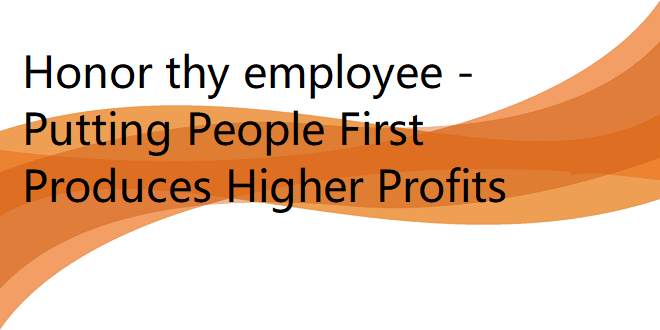Honor thy employee – Putting People First Produces Higher Profits

Honor employees
During a routine visit to a Minneapolis Tires Plus store, I asked a young salesman named Gabe Lopez how things were going. “To be honest with you,” he said, “not too well.” Gabe said he had recently clocked a seventy-hour week only to be told after the fact that he had been “promoted” from an hourly to a salaried position. He felt chumped, that he was owed the overtime money. He had methodically climbed his grievance up the corporate ladder but felt his protest had fallen on deaf ears.
Expect greatness
Don’t worry about setting expectations just beyond the moon. It will pull the best out of them. Jim Pascale, our vice president of franchise operations, saw this a lot. “Working for Tom was like playing for a coach who says, ‘We expect to win championships here,’ ” Jim said. “You find out what you’re made of. You rise up to that level, you practice harder, and you have higher expectations.”
Accommodate family priorities
Contrary to business mythology, putting family first in a disciplined, achievement-oriented culture will actually enhance productivity, not diminish it. Countless times I’ve seen grateful employees tackle their work with renewed vigor after returning from a family-related absence. Maybe parents don’t need to take in every single soccer game, dance line performance, or spelling bee, but a high attendance rate is important to them and to their children. Keep their bodies at work during these events and you’ll lose their hearts and minds.
One afternoon each week, for seven summers, Larry Brandt left work early to cheer at his son Andrew’s baseball game. A key Tires Plus exec and our third-largest shareholder, Larry also ducked out occasionally to root for his other son, Barrett, as he worked his way up to a black belt in karate. To compensate for his absences during the workday, Larry worked at night and on weekends.
Trust employees to deliver
We had a caring, family-oriented culture, but also a hardworking culture. The two naturally go hand in hand. Of course, we also had systems in place, like weekly reports and one-on-one coaching, to ensure that employees stayed on track. If people didn’t live up to their end of the bargain, their privilege parameters were tightened a bit. Honoring and valuing your people and going out of your way to accommodate their personal needs—not to advance your own agenda, but because it’s the right thing to do— produces dedicated employees.
Last word
Doug had spent nineteen years at a well-known national firm. “The executive vice president of operations was confrontational with his staff and pitted his managers against each other,” Doug said. “Because he was unwilling to make a decision he could be held accountable for, we were left to figure out for ourselves what direction our divisions should go.” The inevitable turf wars that followed caused some capable managers to bolt. Even though these were smart, sought-after pros, Doug’s boss spun every loss as a victory. “He would boast to the board that he had weeded out another malcontent,” Doug recalled. “That created a culture of managers who were afraid to make decisions, take risks, or offer creative suggestions. It just became a very stressful place to work.
With its comprehensive coverage and detailed analysis, it offers a valuable resource for trend enthusiasts. By providing accurate and timely information, Trendsactually keeps its audience ahead of the curve. Whether you’re a fashionista, a tech enthusiast, or simply someone who appreciates staying current, Trendsactually has something for everyone.




